Experts from Japan and China discussed the role of the two countries in maintaining peace and order in the region during a breakout session on security issues at the 14th Tokyo-Beijing Forum on Oct. 14. Discussions centered on how Japan and China view security in the region, and how the two nations bear the responsibility to reduce tensions and build peace and order in the region.
How Japan views Asia's security issues
Japanese politician Gen Nakatani kicked off the discussion, saying that despite the various ongoing bilateral talks between North Korea and the United States as well as with South Korea, there appears to be no significant move in North Korea that indicates it is serious about its commitment to denuclearize the Korean Peninsula. The United States still maintains its basic stance, including a military option, and Nakatani expressed concern over how the negotiating parties, particularly South Korea, intend to declare an end to the Korean War, as that would indicate the withdrawal of American troops, something that would benefit only China and North Korea.
The former Japanese Defense Minister also expressed concern over the heightened maritime tension between the United States and China, particularly over Beijing's efforts to increase its military presence in the South China Sea. He also noted how China's setting of buoys within Japan's exclusive economic zone (EEZ) near the disputed Senkaku/Diaoyu Islands is causing tensions to rise in the region. The revision of the National Defense Program Guidelines is slated for later this year and Japan is set to strengthen its alliance with the United States, but Nakatani said such moves will take place while making sure to communicate with China that Japan does not intend to resolve problems using force but will do so by adhering to international laws.
How China views Asia's security issues
Meanwhile, Yao Yunzhu, a retired major general and a senior member of the Academy of Military Sciences of the Chinese People's Liberation Army, said she sees the current situation on the Korean Peninsula as showing major progress. She said North Korea was serious about denuclearizing the region and criticized Japan's negative attitude for merely discouraging Pyongyang and killing the chance at improving the situation. She said she was in favor of officially ending the war on the Korean Peninsula even before a complete denuclearization, if that would help ease tensions in the region. Yao said such a move did not immediately lead to the withdrawal of U.S. troops and said, "Various steps should be considered."
Yao continued to express concern over the heightened tensions between Beijing and Washington on various fronts, including politics and security, saying that dialogue was indispensable to avoid another Cold War. She, however, pointed out that U.S. President Donald Trump's deal-making negotiating style was not appropriate in the area of diplomacy, criticizing Washington's way of trying to link trade issues with the North Korean issue.
The discussion moved on to Sino-Japanese security issues, where Zhang Tuosheng, director of research and senior fellow at the China Foundation for International Strategic Studies, said that the relationship between the two countries is improving, with the maritime communication mechanism now in place and bilateral military education exchanges resuming after a six-year hiatus. He said there is further room for improvement but pointed out that issues such as the Air Defense Identification Zone (ADIZ) over the South China Sea and the gap in the general understanding of the situation in the South China Sea were dampening the successes.
Yao pointed out that the progress of the resumed bilateral military education exchanges was significantly slower than, for example, Sino-Russian exchanges, indicating that the general public in both countries still regard each other as a military threat. China is extremely interested in the revision of Japan's National Defense Program Guidelines later this year, according to Yao, and that now was the turning point and will decide whether bilateral relations continue to improve or deteriorate.
Different perceptions about the North Korean situation
The presentations were followed by an open discussion during which participants showed different perceptions about the situation surrounding the denuclearization of the Korean Peninsula. Ken Jimbo, a professor at Keio University's Faculty of Policy Management, expressed concern that the U.S.-South Korea alliance was backpedaling even though the situation on the Korean Peninsula has not essentially changed. He said it was important to present a concrete process, particularly since Japan's response will depend on how China envisions pushing forward with the current situation.
Yoji Koda, an adviser at Japan Marine United Corporation, agreed, saying that North Korea needs to present a specific list of nuclear facilities and weapons in order to validate the denuclearization process.
Meanwhile, Zhu Chenghu, former dean of China's PLA (People's Liberation Army) National Defense University, said demanding a list was too much, as North Korea was "never going to oblige, if you were in Kim Jong Un's shoes." Zhang concurred, reiterating that now was the chance for a historic breakthrough and that such an opportunity would never come again if the world does not take it now. He criticized the U.S. call for denuclearization in two years, saying, "You will need more than 10 years to see the complete, verifiable and irreversible dismantlement (of North Korea's nuclear program), and we should take it step by step."
U.S.-Japan alliance and Article 9 of the Japanese Constitution
The topic shifted to the U.S.-Japan alliance, where the Chinese participants asked whether Japan had any intention of freeing itself from the "Cold War-type" of mentality that the alliance represented and standing on its own feet.
Jimbo responded that Japan is seeking a multifaceted security framework, and argued that the U.S.-Japan alliance was not based on a Cold War mentality but rather involved a broad partnership that involved disaster response and various other areas. As the defense budget gap increases between Japan and China, Japan will continue to seek such a partnership and go forward with a cross-domain defense initiative, he said.
Koda said that for Japan to protect itself under Article 9 of the Constitution, which does not allow it to have a strategic strike force although it is surrounded by nuclear superpowers, the alliance was "a fruit of wisdom under Article 9 of the Constitution." Yao responded that China and the U.S.-Japan alliance must co-exist in a win-win situation, although adding that it was inevitable that China would feel threatened by the alliance. Zhu Chenghu added that "It would probably be difficult for the Japanese to understand how much the Chinese feel threatened by America ... we would like Japan, the ally, to tell America not to act overly hostile toward China."
The South China Sea issue and UNCLOS
Regarding the discussion over the South China Sea, the Chinese side pointed to the shortcomings of United Nations Convention on the Law of the Sea (UNCLOS) and that the countries were claiming to uphold the law based on their own interpretations. Koda agreed that UNCLOS needs to be debated in order to reach a consensus on its interpretation, while Yuji Miyamoto, chairman of the Miyamoto Institute of Asian Research and a former ambassador to China, added that any such rules need to be reviewed in order to maintain an "Asia that is based on rules."
Public awareness over security issues
The experts from both countries also pointed out the problem of public perceptions regarding security issues. Wu Jinan, president of the Shanghai Association for Japanese Studies, noted how the 14th Sino-Japan public opinion survey showed an increase in the number of people feeling the opposite party to be a threat, and warned that "We miss the positive aspects when we get caught up in stereotypes and start considering the opposite side to be a virtual enemy." Osamu Onoda, an adviser to Toshiba Infrastructure Systems & Solutions Co., noted how the Internet society is increasing the risk of the general public being influenced by fake news, which may cause animosity to develop.
Future of Sino-Japan security cooperation
In the second half of the session, Jimbo started by addressing the need for bilateral cooperation on the North Korean issue. On the question of whether it was possible to satisfy North Korea's demands in exchange for denuclearization, Jimbo said there were three possible areas -- military, politics and economy -- in which North Korea appears to want something. Pyongyang needs to clarify which areas it wants to prioritize, and the negotiating parties need to agree on that before China and Japan can discuss possible aid measures. In fact, Japan had promised in the Pyongyang Declaration it made with North Korea back in 2002 that it was willing to offer economic aid once the issues of denuclearization and the return of Japanese abductees were resolved. Given that it would take over a decade to completely denuclearize the Korean Peninsula, he said concerned parties needed to make sure support is offered without easing pressure on Pyongyang to denuclearize.
Jimbo further said that in order to avoid falling into the Thucydides Trap, a notion that when a rising power challenges the established leader of the international order conflict often ensues, China and the United States should seek a more healthy competitive relationship based on rules. "No matter how much tensions rise between Washington and Beijing, they should not discard the opportunity to communicate their intentions, and that is possible given the history of exchanges between China and the United States," he said.
Regarding the security relationship between Tokyo and Beijing, Jimbo proposed strengthening the maritime-aerial communication mechanism as well as reaching a consensus between Japan's Self-Defense Forces and China's People's Liberation Army on what constitutes a threat. He expected discussions on economic cooperation to developing countries to take place during Japanese Prime Minister Shinzo Abe's upcoming visit to China, and said Japan should also propose the two countries join efforts to promote regional stability such as by providing capacity building in the area of security. Jimbo also said that communication between the police forces and law enforcement authorities of the two countries was important to avoid any tensions from developing into a military confrontation.
Renewing the pledge to avoid war
Next, Wu Jinan took the podium, saying Japan and China should re-acknowledge the spirit of the four basic documents between the two governments, and should agree to never again engage in war at a time when the international order is threatened and uncertainty prevails. But there are too many misunderstandings between Japan and China, he said, and the two parties need to enhance dialogue and adopt various trust-building measures to "resolve the discrepancies constructively."
Wu Jinan also called for the need to build a multinational mechanism, and suggested reviving the six-way talks and turning such a framework into a peace-making mechanism for the region in the future. He said there is ample room to expand dialogue and promote cooperation in non-traditional security areas, including non-military threats to politics, economy and society, such as climate change, terrorism, piracy, poverty, financial crisis and plagues.
Meanwhile, Wu Huaizhong, a researcher at the Institute of Japanese Studies of the Chinese Academy of Social Sciences, warned there was still a risk of an unintended military clash between Japan and China, and that the current communication mechanism was insufficient. He did, however, acknowledge that the two countries were unlikely to intentionally engage in a war again, as Prime Minister Abe's repeated references in the Japanese parliament to a friendly relationship with China imply.
Wu, however, stated that Japan's security policy is still heavily dependent on the United States and urged Japan to take a more cooperative stance with China while maintaining its alliance with the United States.
In regards to the North Korean issue, Wu said stability on the Korean Peninsula would benefit Japan and China, and the issue offers room for a major collaborative effort between Tokyo and Beijing. The subject of Japanese abductees is making it difficult for Japan to engage more aggressively in the current situation, but Japan should make a firmer commitment to the peace process on the Korean Peninsula and should consider having China serve as a mediator, he said.
Masahiro Akiyama, director of Akiyama Associates and chairman of the Society of Security and Diplomatic Policy Studies, said that while this may sound a little inappropriate, the denuclearization of North Korea may be a good excuse to promote cooperation between Japan and China on security issues.
Cooperation in new fields
Akiyama continued that the East Asia region is the leading area for recent security issues such as cyber security and space use, so Japan and China should take the lead in addressing these areas, which are becoming more noticeable in recent years. Wu Jinan agreed, saying, "Japan and China should jointly propose to the world a ban on military use of cyberspace." Meanwhile, Yao Yunzhu pointed out the risk of using artificial intelligence for military purposes and proposed cooperation in establishing rules to control its use.
Masanori Nishi, a former Japanese vice defense minister, shared the example of how former Japanese Self-Defense Forces personnel are volunteering to dig up chemical weapons disposed of on Chinese soil by the Japanese Army during World War II, and that the project is being shared completely between Japan and China, including the use of a crisis management system. Nishi said a similar project will become necessary when North Korea opens itself up, and that Japan and China could jointly cooperate if such a need arises. Yao Yunzhu similarly mentioned the possibility of joining efforts in humanitarian assistance and disaster relief efforts, while Zhang Tuosheng mentioned expanding the cooperative efforts in providing security to Africa's sea lanes when importing African resources.
Indo-Pacific strategy and co-existence with China
Meanwhile, Chen Xiaogong, a retired lieutenant general of the People's Liberation Army Air Force of China, expressed concern over Japan's "free and open Indo-Pacific strategy" that Prime Minister Abe introduced as part of a broad Asia strategy in 2016. Chen said the move appears to coincide with U.S. concern over the Indo-Pacific region, and that collaboration between Japan, the United States, India and Australia seems to compete with China's "One Belt, One Road" initiative.
In response, Onoda said the focus was on the "free and open," not on military incentives. "It may appear that America's Indo-Pacific strategy is targeting China and Russia, but that's not the case for Japan," Onoda said, although adding that he was unsure in what context the strategy will be mentioned in the upcoming new defense guidelines.
Jimbo explained that Japan's regional strategy concept has shifted from Asia-Pacific in the 1990s to East Asia in the 2000s and to Indo-Pacific in the 2010s, and that the most recent Indo-Pacific strategy is merely a second version of the earlier one. He said the Trump administration unexpectedly used the same "free and open" phrase, but Japan has replaced the earlier concept of "diplomacy's value" to "open economy order based on rules," laying emphasis on the economy. Jimbo further said that Japan, the United States, Australia and India all have different views of the region, hence they have not proceeded to form a quad-alliance and will not become a threat to China's "One-Belt, One Road" initiative.
Nishi added that there is a conflict of interest between India and Australia when it comes to the Indian Ocean, so it was unlikely for the four countries to build a consensus. He rather said that the four countries may move closer if China tries to advance into the Indian Ocean and create a reason to truly build a common strategy. Zhang noted that Abe suggested merging Japan's Indo-Pacific strategy with China's "One Belt, One Road" initiative, with which he wholeheartedly agreed as a major chance to expand Sino-Japanese cooperation.
Need for dialogue between Japan and China, and also with the United States
Experts from both countries repeatedly emphasized the need to maintain dialogue, with Koda and Chen saying working-level talks were necessary to bridge the gap in understanding about UNCLOS, while Zhang called for the expansion of security dialogue beyond Japan and China to include the United States. With relations between China and the United States strained, Chen expressed expectations that Japan will act as a mediator during such talks. Yao Yunzhu added the need to keep information transparent, which would help ease the lingering sense of threat that each country feels.
In conclusion, Miyamoto said he expected the tensions between the United States and China to worsen, and that Tokyo and Beijing should push forward all possible issues upon which they could cooperate before the situation worsened. "As Mr. Akiyama said, the North Korean issue could be an excuse to bolster Sino-Japanese cooperation, and a comprehensive program is necessary when considering (North Korea's) demands, as Mr. Jimbo says. For that we need to draw the big picture together," he said.
Chen, who is the son of China's first ambassador to Japan upon the normalization of Sino-Japanese diplomatic relations in 1972, Chen Chu, wrapped up the session by describing to the audience episodes he shared with his father about how the two countries had overcome various difficulties over the years, and concluded that the key to tackling such difficulties was exchanges and dialogue.
Read more:
• Japanese, Chinese policymakers and opinion leaders mull ways to deepen Japan-China relations strategically and pragmatically
• Tokyo Consensus 2018
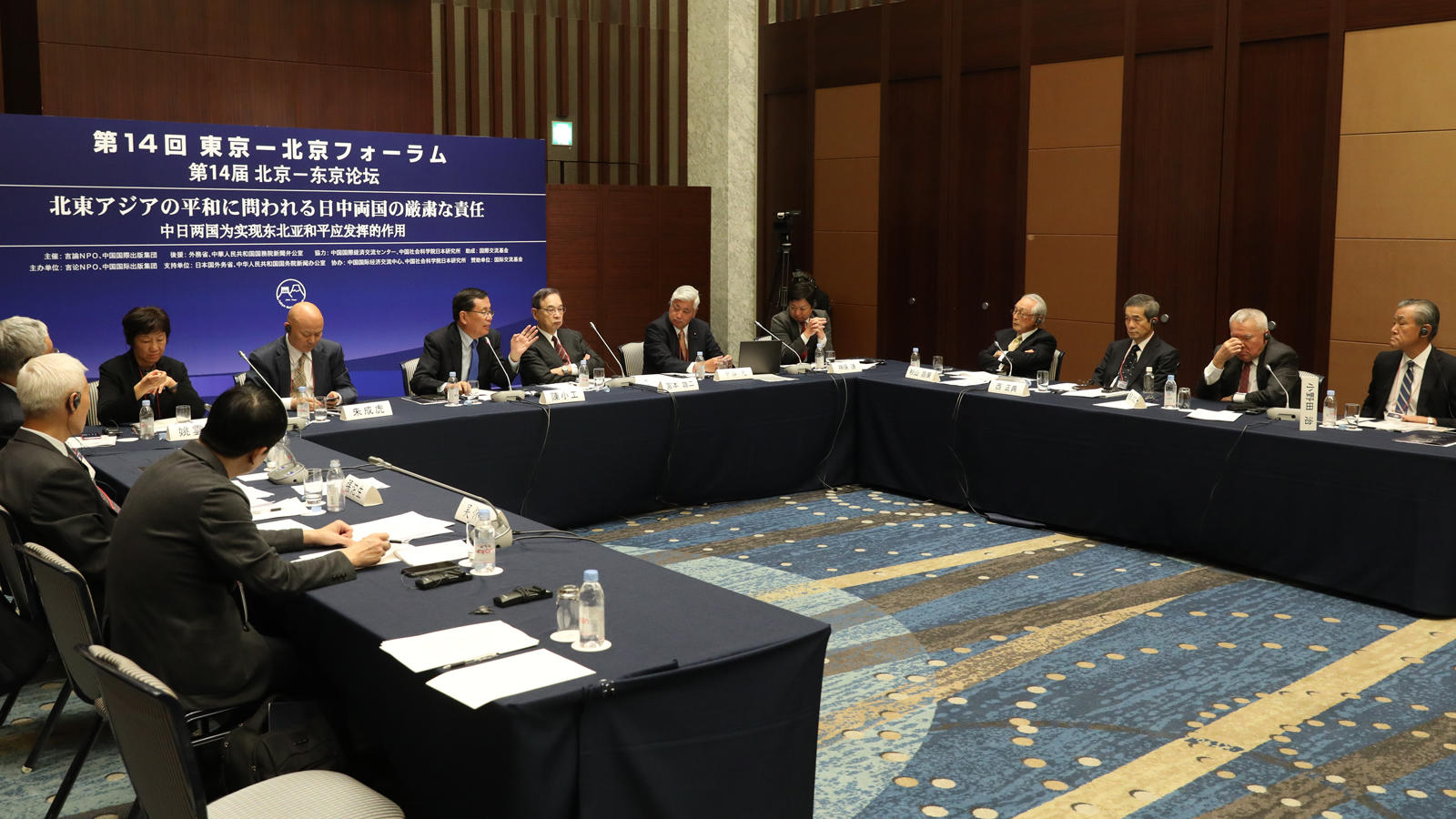
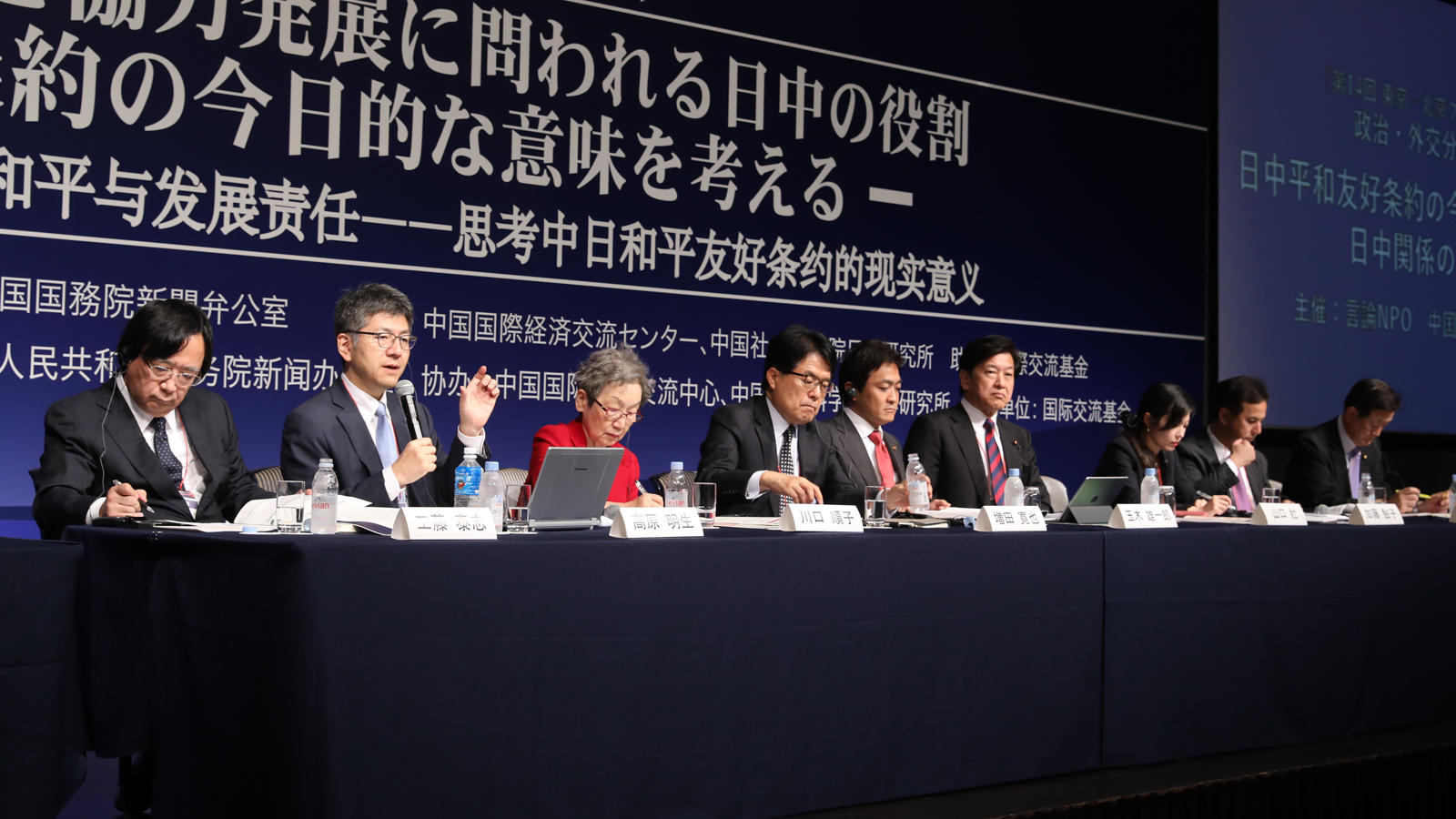
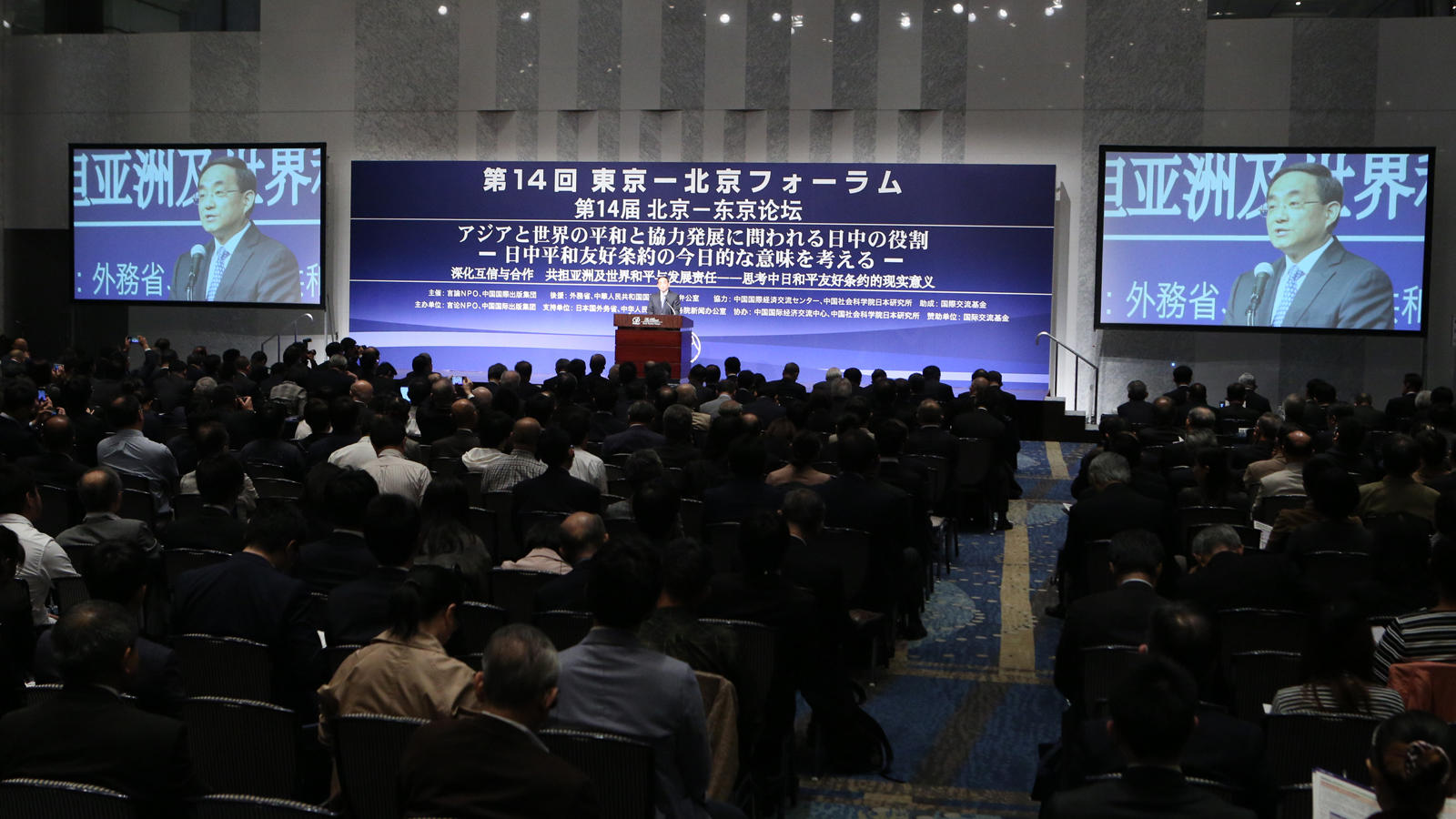
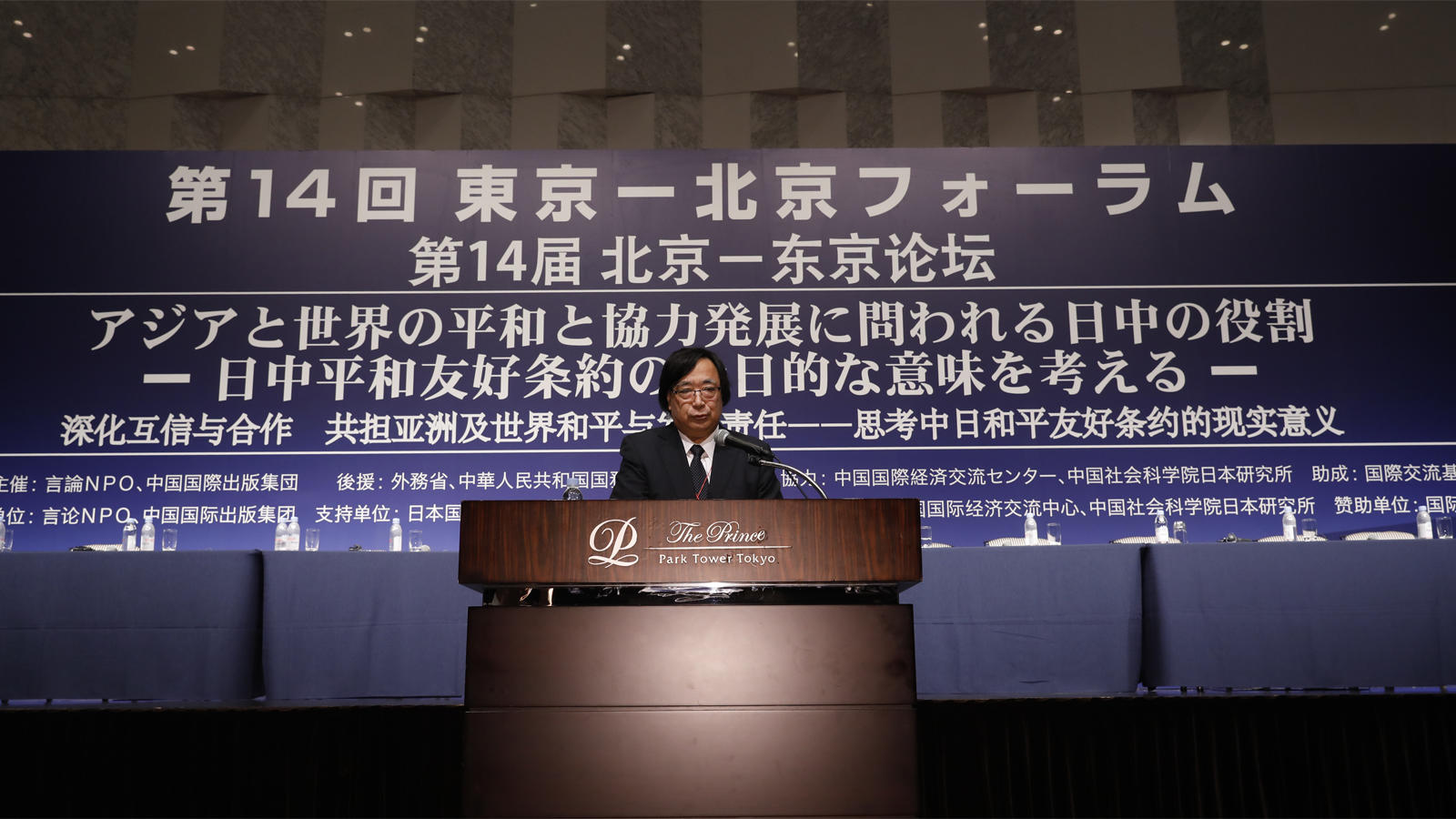
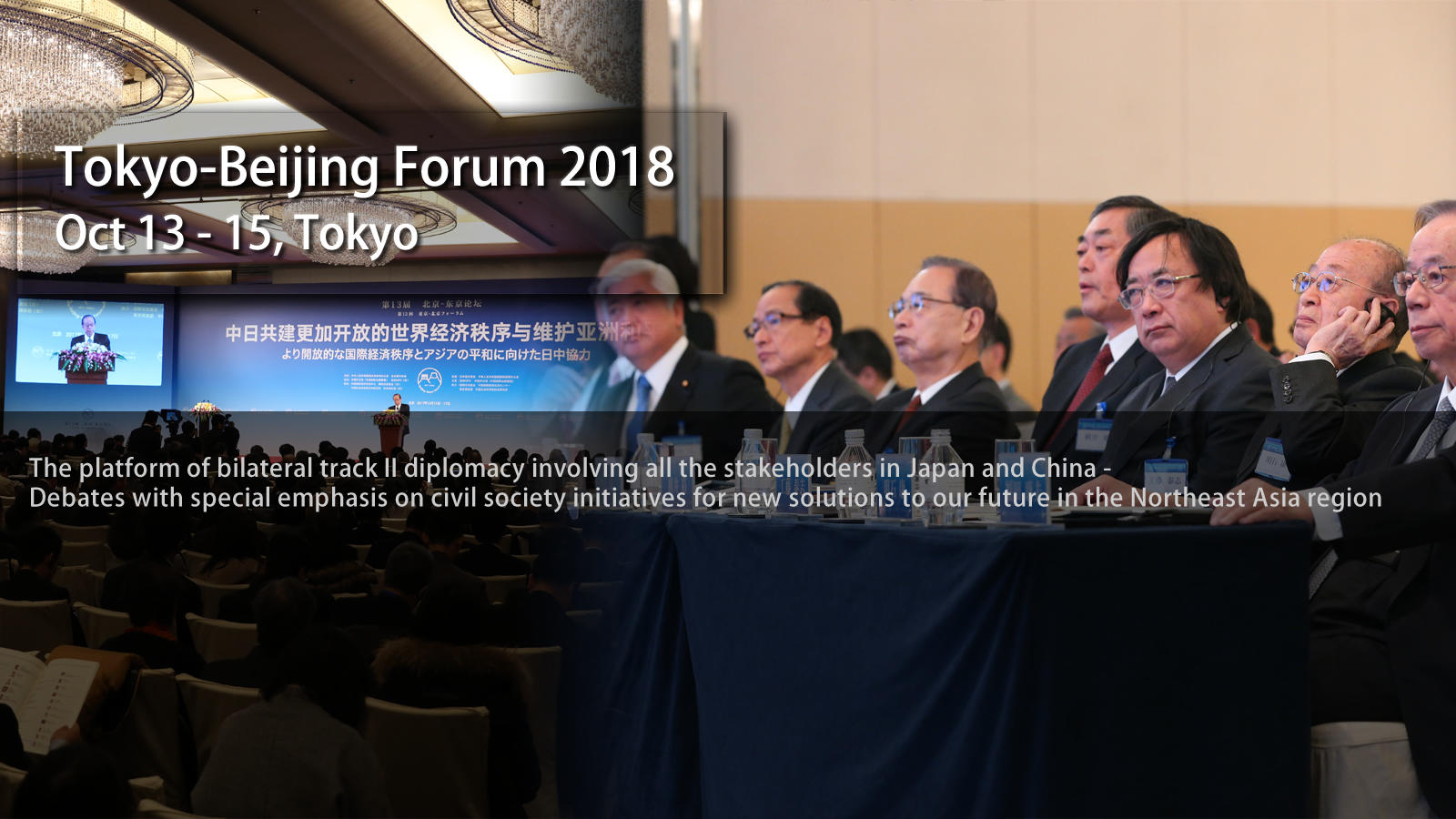
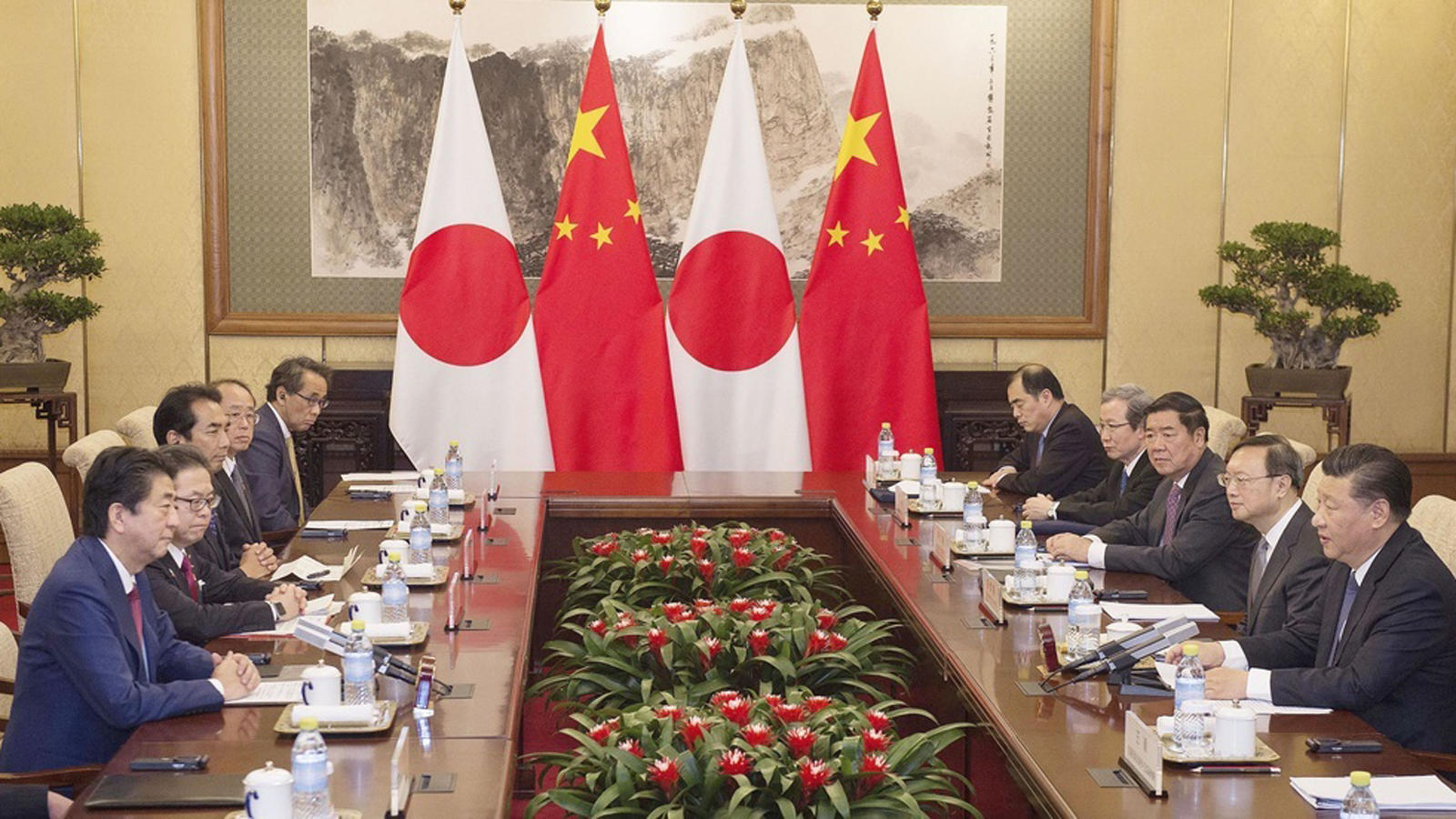
Post a comment